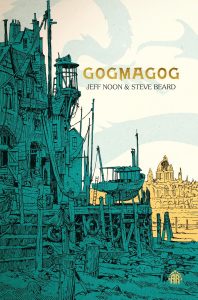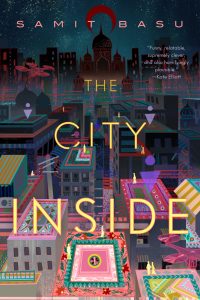Ian Mond Reviews Gogmagog by Jeff Noon & Steve Beard
 Gogmagog, Jeff Noon & Steve Beard (Angry Robot 978-1-91520-282-6, $18.99, 353pp, tp) February 2024.
Gogmagog, Jeff Noon & Steve Beard (Angry Robot 978-1-91520-282-6, $18.99, 353pp, tp) February 2024.
Gogmagog is the first novel I’ve read by Jeff Noon since the publication of Nyphomation in 1997. The books he wrote immediately after his Vurt phase – Needle in the Groove and Falling Out of Cars – didn’t appeal to twenty-something Ian (though Falling Out of Cars looks right up the alley of fifty-something Ian). By the time Noon wrote his Nyquist Mysteries, I had gotten out of the habit of purchasing his work. As for Steve Beard, Noon’s co-author on Gogmagog, who also co-wrote Mappalujo with Noon, he’s never been on my radar (I do, however, like the look of Digital Leatherette, Beard’s “ethno-techno cyberpunk” novel published around the same time as Needle in the Groove). So, there’s something nostalgic and exciting about returning to the wild imagination and propulsive storytelling that captivated me in my twenties. And I’m happy to say that Gogmagog, the first book in the Chronicles of Ludwich, delivers on that front.
Seventy-eight years old, Arcadia “Cady” Meade is an ex-sailor and once Captain of the Juniper, living her “retirement” in the port city of Anglestume. When she’s not spending her pension on ciggies and drink or singing old sea shanties and swearing like, well, a sailor, Cady is checking in on her old cabin boy, Yanish – an orphan she pulled out of the River Nysis – now making his living as a fisher. Everything changes when the never-never, a plant that germinates a cloud of seeds that can sometimes take human form, sends Cady a coded message of a bell, a gravestone and a flying bomb. It’s a message connected to two recent arrivals: a Thrawl named Lek and his companion, a ten-year-old Alkhym named Brin. They desperately need to reach Ludwich for the Hesting festival, where Brin, who has reached the age of maturity, will sprout her antennas. They need Cady’s assistance, aware that she’s one of the few who has safely traversed the River Nysis, particularly the treacherous stretch haunted by Faynr, the ghostly body of the fabled dragon Haakenur. Reluctantly, Cady agrees, and along with Yanish, she, Lek and Brin take the Juniper on one last voyage to Ludwich. But not all is as it seems. Brin is no ordinary ten-year-old, Lek is no ordinary robotic butler and Cady, well, she’s no ordinary sea-farer – in fact, she’s much, much older than she looks. And awaiting all of them, in the estuaries of the Nysis, is the demonic Gogmagog.
I’ve never been that interested in the mechanics of worldbuilding (it might have something to do with my aversion to roleplaying games). But with Gogmagog, I found myself questioning, even second-guessing, the nature of Cady’s world. The novel’s title, coupled with references to King Lud and the Wodwos (one of the six tribes of the Kindred, of which Cady is a member), suggests a secondary world inspired by Geoffrey of Monmouth and Medieval literature like Sir Gawain and the Green Knight. Moreover, a multi-year war between the Kethran Isles (our stand-in for Great Britain) and the Enakor, with X2 (not V2) bombs falling over Ludwich, has echoes of the German blitz over London. Noon and Beard don’t limit themselves just to British history and mythology; other Kindred tribes, such as the Nebulim (the revived dead encased in clay bodies) and the Azeel (marked by their unique shadows and “aphelon” at the centre of their brow) hint at Hebraic and Arabic origins.
But while it’s one thing to have a secondary world that draws from European and Middle Eastern cultures and beliefs, it’s something else to have a historical figure from our reality, in this case, Doctor John Dee (yes, the same John Dee who advised Queen Elizabeth I), pop up as a pivotal member of this society (Cady, in her past, has had several dealings with him). Did John Dee fall through a portal into this world? Or is he a parallel version of our John Dee? This anachronism is never resolved; if anything, Noon and Beard – gleefully – add further bewilderment to the mix by presenting an origin story for the Kindred tribes (the Wodwo, Azeel, Nebulim, Thrall, Alkhym, and Ephreme) that, to put it elliptically, is out of this world.
To be clear, the instability of Gogmagog’s worldbuilding is part of the fun. It feels like an example of “anti-fantasy” (a phrase I’ve borrowed from Abigail Nussbaum, whose outstanding collection of criticism I discuss below), encouraging the reader to identify a specific trope – in this case, the conventions of Western, Tolkien-inflected, worldbuilding – only to undercut that trope throughout the story. It works exceedingly well as a metanarrative, constantly questioning the reader’s assumptions and preconceptions about what constitutes “proper” worldbuilding. Noon and Beard aren’t the first to play this game – China Mieville, M. John Harrison, Alex Pheby, and if we go way back, even Mervyn Peake have all had their shot – but here it feels a little more disorientating, a little more knowing, a little more brazen. Especially given, in all other respects, the story is a traditional epic quest, albeit one featuring several exciting set-pieces involving demons, phantasms and sea monsters.
Of course, you can’t get away with all this subversion if the characters and the stakes they face don’t have a certain heft – otherwise, it’s all scaffolding, no substance. While Cady is an unreliable narrator (at least to begin with), she anchors the story, translating her world back to us in a way that seems consistent in her mind (even if it doesn’t feel that way to us). Through Cady, we gain an appreciation of each tribe, whether it be the winged Ephreme, the aristocratic Alkhym or the Golem-like Nebulim. And, because Cady has experienced so much during her life, we’re left in no doubt about the threat the demon Gogmagog poses to the fabric of her multicultural society. It also helps that Cady is a memorable character, with the gruffness, drinking habits, and lack of hygiene of a Jackson Lamb, but coupled with a compassion and loyalty to her friends. Her relationship with Yanish is a highlight, especially as he comes to terms with the revelation that his father, fighting for Kethra, ran from the battlefield, a mortal sin for an Azeel.
There is a haziness to some parts of the plotting. The novel’s events are meant to occur over 36 hours, and yet it feels much longer than that. But, like the worldbuilding, this might also be a feature rather than a bug, another means of unsettling the reader’s expectations. Either way, Gogmagog is a terrific start to The Chronicles of Ludwich.
Ian Mond loves to talk about books. For eight years he co-hosted a book podcast, The Writer and the Critic, with Kirstyn McDermott. Recently he has revived his blog, The Hysterical Hamster, and is again posting mostly vulgar reviews on an eclectic range of literary and genre novels. You can also follow Ian on Twitter (@Mondyboy) or contact him at mondyboy74@gmail.com.
This review and more like it in the August 2024 issue of Locus.
While you are here, please take a moment to support Locus with a one-time or recurring donation. We rely on reader donations to keep the magazine and site going, and would like to keep the site paywall free, but WE NEED YOUR FINANCIAL SUPPORT to continue quality coverage of the science fiction and fantasy field.
©Locus Magazine. Copyrighted material may not be republished without permission of LSFF.







